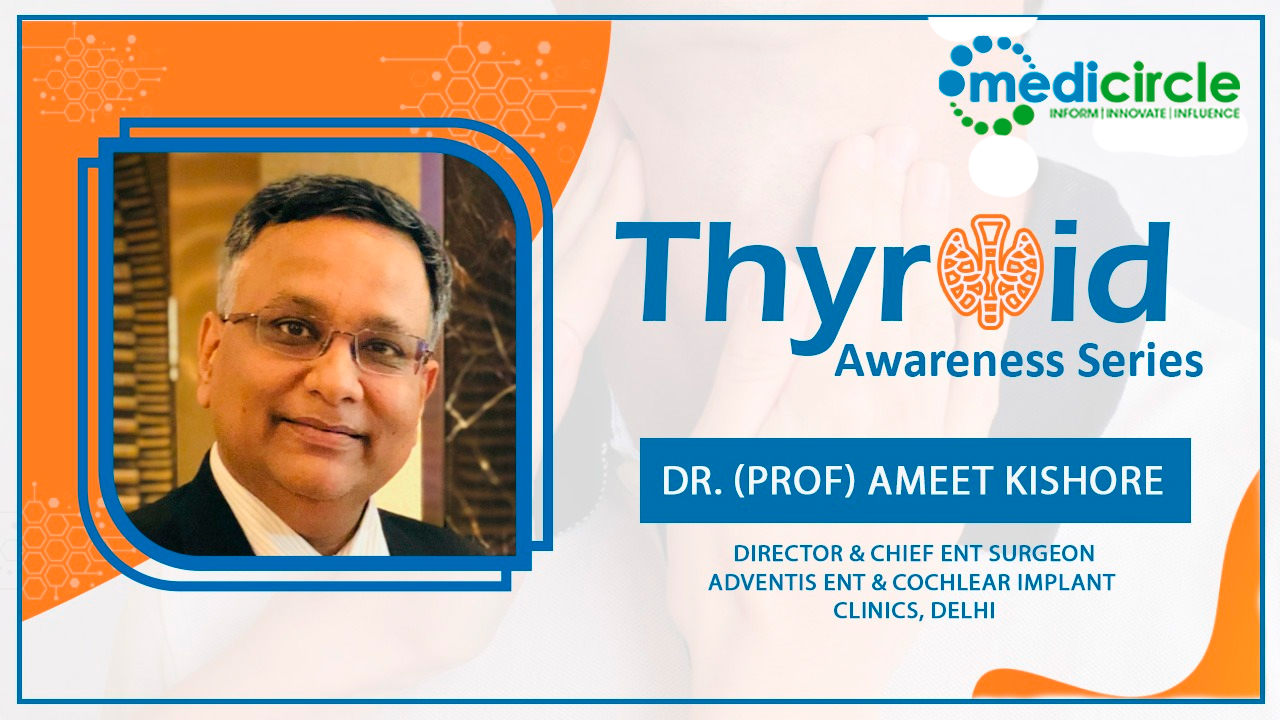Dr (Prof) Ameet Kishore is an ENT specialist in Delhi with over 25 years of experience. He is a Senior Consultant & Coordinator in ENT & Neurotology at Indraprastha Apollo Hospital, New Delhi and the Founder & Lead Consultant of Adventis (Advanced ENT Service). He is also the honourable secretary of the Cochlear Implant Group of India.
Types and Causes of Thyroid
Dr. Kishore begins, “Thyroid disorder is quite common. We can broadly divide thyroid disorders into 2 groups. The first is a medical thyroid disorder wherein the thyroid hormone in the body increases. This is also called a hyperthyroid disorder. If the thyroid hormone reduces then it is hypothyroid disorder.”
“In the second type of thyroid disorder, we see lumps or tumours in the thyroid gland. This is known as thyroid nodules or swelling or goiter. This is prone to benign or cancer. The most common type of thyroid seen is the medical thyroid. Within this hypothyroid disorder is the most common.”
“There are many causes of the hypothyroid disorder, like age, diet, iodine deficiency and certain immune-mediated conditions like Hashimoto's thyroiditis. Sometimes the causes are related to certain medicines and radiation. Diabetes could also be a cause. My point is that there are multiple causes of hypothyroidism, which makes the body produce less thyroid hormone.”
“The opposite of this is hyperthyroidism, where there are many infections known as thyroiditis. In thyroiditis, there is an infection that leads to an increase in the blood supply that leads to the glands producing more thyroid hormone and secreting it in the body. In hyperthyroidism, the amount of thyroxine increases.”
Role of Diet in Thyroid
Dr Kishore explains, “For the proper functioning of thyroid hormone or for the production of thyroxine, the body needs a certain amount of nutrition level. If our diet is not satisfactory if there is an imbalance then it affects our production of thyroid hormone and thyroxine. Nowadays, what we eat has drastically changed. Consumption of fast food and packaged food leads to problems.”
“So it is important to have a good diet to maintain our thyroid levels. Include fresh fruits and vegetables and nuts in your diet. As to make thyroxine, our body needs nutrients and micro-nutrients. If the nutrition is weak in our diet, it would naturally be unable to make the hormone.”
“If you are diabetic and your sugar levels are high then that leads to problems. If you are not eating green vegetables, fruits, nuts and eggs in adequate quantities then it leads to the thyroid. If your diet includes a lot of prepackaged foods and fast foods, then that too can lead to the thyroid.”
“Many people also tell that eating certain vegetables like cabbage and broccoli can lead to the thyroid. This is true to a certain extent as these vegetables are goitrogens. Goiter means the irregular growth of the thyroid gland. If you eat such vegetables in large quantities then it may lead to a problem. But consuming it in a normal amount will not cause any problem.”
“The other important cause is iodine deficiency. Fortunately, many eat iodised salt which has reduced the problem of goiter. My advice is to eat healthy and balanced meals and include fresh foods. Along with this control your sugar and blood pressure levels.
Thyroid in India
Dr. Kishore says, “It is seen that in every 200 people, 5 have a thyroid problem. This is more so in women. The numbers show that this is very common. With thyroid, there are certain comorbidities. The common comorbidities are diabetes, hypertension and autoimmune diseases. Autoimmune disease is a phenomenon where the body destroys its own organs. Diabetes and rheumatoid arthritis are autoimmune diseases. People with autoimmune disease have a higher risk of the thyroid.”
Symptoms of Thyroid
Dr Kishore mentions, “There are certain symptoms we look for when we have a patient come to us regarding thyroid. If the typhoid hormone is less, hypothyroid, then it is associated with an increase in weight, hair fall, rough skin, changes in the voice and lethargy. In hyperthyroidism, where the thyroid hormone is more, there it is associated with weight loss, feeling heated, an increase in the appetite and heartbeat, anxiety and hyperactivity.”
“In either of the problems, we will first recommend getting a blood test. The simplest is the Thyroid function test. Here we check the T3, T4, and TSH. If there is a fluctuation in these tests, then we go for further tests. We go for an ultrasound, radionuclide scan, and even get investigate the heart to know the causes of fluctuation.”
“There is a third type of thyroid problem which is swelling. If you have noticed swelling or the formation of lumps near the neck area, then this is thyroid gland enlargement. This is medical term is called a goiter or thyroid lump. When you notice these signs then you must visit a doctor. The doctor will recommend you go for an ultrasound. The doctor will also investigate whether this is a lump or a tumour. For third one must consult a thyroid physician or endocrinologist.”
Thyroid and Covid-19
Dr. Kishore elaborates, “Covid-19 has changed the world completely. Because of Covid, many new things are emerging in medical science. This is a learning process and we will continue to learn. There are many studies that are happening for Covid and Thyroid. The studies, till now, haven’t proved a definite connection between the two. The one thing that’s there is comorbidity. So if you have thyroid, you can also have diabetes, hypertension, or autoimmune diseases. Because of this, there is a possibility that one is more prone to Covid. It is not because one has thyroid but it is there because there are many comorbidities attached to it.”
Edited By: Priyal Shah
Contributed By: Dr. (Prof) Ameet Kishore, Director & Chief ENT Surgeon, Adventis ENT & Cochlear Implant Clinics, Delhi

 Learn the types of thyroid, particularly Hypothyroid and Hyperthyroidism. Know which signs tell that one might suffer from thyroid. Know more about those habits that reduce the risk of the thyroid.
Learn the types of thyroid, particularly Hypothyroid and Hyperthyroidism. Know which signs tell that one might suffer from thyroid. Know more about those habits that reduce the risk of the thyroid.






.jpeg)

.jpg)










.jpeg)





.jpg)




.png)



